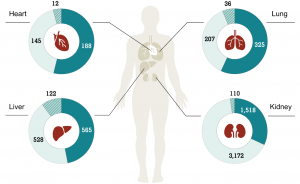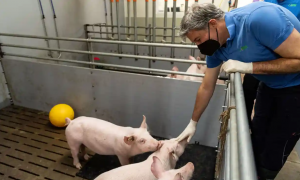If due to an unfortunate accident, you were on the National Organ Waitlist for a heart transplant, would you consider receiving a heart from an animal?
For decades, doctors have tried to transplant animal organs in human bodies, but have not been successful. Partly, because of how complex the human body is.
Human Body & Organ Transplant
The human body is like a very complex machine, with microscopic vessels and delicate tissues. So complex that if one part of the body is injured, the rest of the body will be affected by it. This becomes fatal if the injured body part happens to be a vital organ, such as the heart.
Since the dawn of medicine, scientists and doctors have researched and studied techniques to perfect human organ transplants. Due to the complexity of the human body, organ transplants can commonly result in complications and possibly death.
One of the biggest challenges of organ transplants is finding a matching blood type. If the recipient’s blood type does not match the donor’s blood type, the recipient’s body will attack the organ. During organ rejection, the transplanted organ is nothing more than a foreign object to the body, like bacteria, it will try to remove it which usually ends in the death of the patient.
Another side of the problem is finding organ donors because there is a shortage of healthy organ donors all around the world. For example, as you can see from the image below, last year in Canada, about 280 people died while waiting for an organ transplant. This shortage is much greater in more populated countries such as the US.

https://www.cihi.ca/en/organ-transplants-in-canada-2020-donations-and-need-infographic
Genetically Modified Pig Heart Transplant
However, on January 7th, scientists and doctors made a huge advancement in this field. They were able to transplant the first-ever genetically modified pig heart into a 57-year-old man, who was suffering from life-threatening heart disease. David Bennett has been recovering from the operation but is currently healthy and stable.
Why use a genetically modified pig heart?
There are many reasons why scientists used a pig as the donor, mainly because pigs are very anatomically similar to humans. In both adulthood and childhood, their organs are similar in size and function to humans, making them well suited for transplant. Additionally, pigs reproduce at a fast pace and can be bred at high health standards in labs. There are labs in the world that breed and clone pigs for organ transplants.

https://www.theguardian.com/science/2022/feb/03/german-researchers-to-breed-pigs-for-human-heart-transplants
Using advanced technology, scientists were able to edit parts of the DNA of a pig and turned off genes (the building blocks of DNA) that resulted in organ rejection. This eliminated the need to find a compatible blood type donor.
In Conclusion:
If more research is completed on genetically modifying animals for organ transplants, we might be able to solve the organ donor shortage entirely. Patients will not have to wait on long lists to receive organs to live and we could minimize the risks of organ transplants significantly.
By Shayan Abbaszadeh

One response to “First Genetically Modified Pig Heart Transplant”